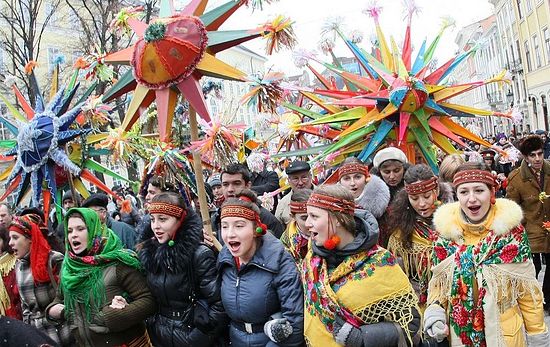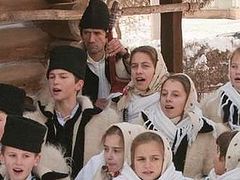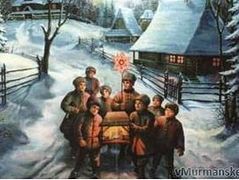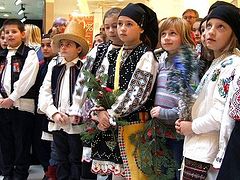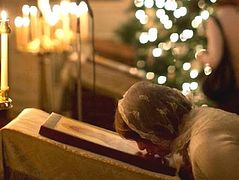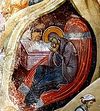The main thing is not to stain but to continue whitening the garments of our souls, Priest Andrei Chizhenko believes.
In the Church liturgical cycle the Nativity of Christ is the second most important festival after Easter and that is why it is celebrated for whole twelve days. As always, the all-merciful Lord abundantly pours out His grace and light upon us. Hence the Russian name of this season: “Svyatki”, that is, “Holy Days”. In ancient times Christmastide was called “Holy Evenings” probably because it was in the evenings that Christians would leave their everyday work and celebrate the Nativity of Christ and the Theophany.
The history of Christmastide is as follows…
In the first centuries of Christianity the Church knew only one festival—the Theophany (another name for it is the Baptism of Christ). Two events in the Savior’s life on Earth were commemorated on that day: the Nativity of Christ and His Baptism.
Later, in the fourth century, these two feast days were separated from each other. The Nativity of the Lord was transferred to December 25 according to the old calendar (January 7 according to the new calendar), while the Theophany is celebrated on January 6 according to the old calendar (January 19 according to the new calendar) even to this day. But as in the Church consciousness these two feasts merge into one feast, the twelve days that now separate them are considered one continuous feast. Similarly, the forty days after the Resurrection of Christ until the Ascension of the Lord are celebrated as Easter because the Savior continued to appear to His disciples during this period.
This is why the period between Nativity Day and the Baptism of the Lord is called Christmastide (Svyatki in Russian: derived from the Russian words “light”, “holiness”).
The feast goes on… It did not end on January 7 on the day of Nativity of Christ. January 8 is the Synaxis of the Most Holy Mother of God. January 10 is the commemoration of Christ’s relatives “according to the flesh”: the Holy King and Prophet David; St. Joseph the Betrothed; and Apostle James, the Brother of the Lord, who accompanied the Holy Family to Egypt. January 11 is the commemoration of 14,000 martyred infants (known as the Holy Innocents) who were killed in Bethlehem. Further, the leave-taking of the Nativity of Christ is on January 13 (according to the new calendar), the day before the Circumcision of the Lord. But festivities related to the Nativity and Baptism of the Lord continue. In effect, they end on January 18, the Eve of the Theophany, which is a strict fast day. And the festivities conclude at the feast of the Baptism of the Lord.
So the task of all Orthodox Christians is to celebrate. If possible, to adjourn all secular things and to participate in this great mystery—the Birth of God on Earth for our salvation. Throughout Christmastide, Wednesdays and Fridays are non-fast days when foods containing animal products are allowed. Priests are often asked the following question: “How can we recieve Communion at Christmastide, or on Theophany, if there are no fast days?” Traditions and various opinions concerning this abound. But most priests agree on the following: food restrictions before Communion at Christmastide are not compulsory for an Orthodox Christian whose life in the Church is very serious and who observes all fasts. After all, fasting is abolished for this period by the Typicon! However, it is not an excuse for our Slavic soul (which likes to do things in a big way) to give itself up to drunkenness, gluttony and revelry. Moderation is important in everything. So before the Liturgy at Christmastide, a communicant is obliged to keep only the Eucharistic fast, that is, abstaining from any food or drink from the midnight of that day till the moment of taking Holy Communion.
In addition to this, prostrations either at church or at home are forbidden throughout this season. This is what is written of Christmastide in the Rule of the Venerable Sabbas the Sanctified who lived in the sixth century: “Neither fast nor full prostrations are allowed at churches or in cells.”
It is also desirable to refrain from work. Of course, here is not meant necessary work of our everyday life that cannot be avoided—for example, cooking, looking after domestic animals, chopping firewood, heating the stove and so forth. Yet it is better not to do any major or non-obligatory work. But it does not apply to those who work in the performance of their official duty. In this case, they should repent of this involuntary sin at the next confession.
In fact, the Christmastide period is given us for the following things…
Through His Nativity the Lord abundantly poured out His grace upon us and our duty is to spread this grace (at the Christmastide season in particular). Thus, our main task at Christmastide is glorifying Christ incarnate: visiting each other, singing Christmas carols and spiritual hymns, attending church services (which are frequent at this period), and performing works of mercy – visiting the sick, prisoners, elderly people, orphans, giving generous alms and so on.
In conclusion I would like to cite the words from St. John of Kronstadt's book, My Life in Christ, for our generous Eastern Slav nature, which is prone to passing so easily from joyfully celebrating to wild carousing:
“It is so deplorable to see the evil one levying his tribute on Christians at the Lord’s feasts, an enormous tribute; and the greater the feast the greater is the tribute paid by Christians; for, what do we see at feasts? Sheer idleness, lack of restraint of the flesh, drunkenness, debauchery, fights, thefts, entertainments. My God! What a pleasing of the flesh! What zealous service of the devil! Are these people really Christians redeemed by the precious Blood of the Son of God? Are you really living in Christian times and not pagan? Are you really partakers of the life-giving sacraments?”
Dear brothers and sisters, let us keep the words of this great saint in our minds. Let us not stain the garments of our souls, whitened by the Nativity fast, with the filth of revelry. All things in moderation are good.
The main thing at Christmastide, as on all days of the life of an Orthodox Christian, is to love God and to love our neighbor. Let us praise Christ incarnate! Let us preach this good news to the world. Let us perform the works of mercy, of charity, stretch out a helping hand to all who need it.
Christ is born; glorify Him! Christ comes from heaven; go to meet Him!

